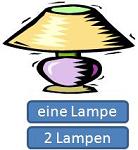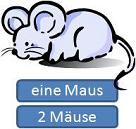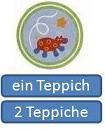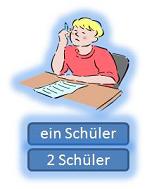For English speakers, the plural in German is exasperating. We are happy to just add a simple "–s". In German it’s much more complicated. Get into fighting mode; we think you’ll need to. Here’s our explanation:
Because this subject is pretty complicated, we’ve made a small table with the most common suffixes for making the plural depending on the gender:
| Masculine | Feminine | Neuter | |
|---|---|---|---|
| Common | [-e] [¨-e] [ - ] | [-en] [-n] [-nen] | [-e] [ - ] |
| Less common | [-en] [-n] [ ¨ ] | [¨-e] | [-er] [ ¨ -er] |
| Adopted foreign words | [-s] | ||
Some nouns do not have a plural form in German:
| Example | Meaning |
|---|---|
| die Türkei | Turkey |
| die Wolga | the Volga |
| München | Munich |
| Example | Meaning |
|---|---|
| die Zweisprachigkeit | bilingualism |
| die Abgespanntheit | exhaustion |
| die Zuvorkommenheit | courtesy |
| die Wut | rage |
Just like in English it’s normal to construct the plural with the ending "–s". In German, however, only a few adopted foreign words have this plural.
| Noun | Plural | Meaning |
|---|---|---|
| die Kamara | die Kamaras | camera |
| der Gorilla | die Gorillas | gorilla |
| das Auto | die Autos | car |
The construction of the plural for feminine nouns is the easiest in German:
The possibilities are:
| Frequency | Plural |
|---|---|
| Very common | Adding "-en" |
| Adding "-n" | |
| Common | Adding "-nen" |
| Rare | Adding [Umlaut] + "-e" |
| "-nis" -> "-nisse" | |
| Very rare | Adding [Umlaut] + "–en" |
| Adding [Umlaut] | |
| "-a" -> "-en" | |
| "-sis" -> "-sen" | |
| "xis" -> "-xien" | |
| "-aus" -> "-äuse" | |
| "-itis" -> "-iden" |
The large majority of feminine nouns that do not end in "-e" make their plural with "-en":
| Noun | Plural | Meaning |
|---|---|---|
| die Datei | die Dateien | file |
| die Wohnung | die Wohnungen | apartment |
| die Fabrik | die Fabriken | factory |
The following endings which guarantee that the noun is feminine should be emphasized: "-ei", "-ung", "-heit", "-keit", "-ion", "-schaft", "-ik", "-eur", "-enz", "-tät", "-itis", "-sis". 
If a feminine noun ends in "-e", its plural is always constructed with "-n" (Note: Not all nouns ending with "-e" are feminine. For example: der Käse)
| Noun | Plural | Meaning |
|---|---|---|
| die Lampe | die Lampen | lamp |
| die Fantasie | die Fantasien | fantasy |
| die Narzisse | die Narzissen | narcissus |
The following endings guarantee that the noun is feminine and their plural is with "-n" : -ie , -ade, -age, -ere, -ine, -isse, -ive, -se,
The feminine nouns that end in "-in" make their plural with "-nen".
| Noun | Plural | Meaning |
|---|---|---|
| die Chefin | die Chefinnen | boss |
A few feminine nouns add [Umlaut] + "-e".
| Noun | Plural | Meaning |
|---|---|---|
| die Kraft | die Kräfte | force |
| die Angst | die Ängste | fear |
Some words not from German origin ending in "-a" make their plural with "-en"
| Noun | Plural | Meaning |
|---|---|---|
| die Firma | die Firmen | company |
| die Skala | die Skalen | scale |
Nouns ending in "-sis" construct their plural with "-sen"
| Noun | Plural | Meaning |
|---|---|---|
| die Analysis | die Analysen | analysis |

The plural for nouns ending with "-xis" are constructed with "-xien"
| Noun | Plural | Meaning |
|---|---|---|
| die Galaxis | die Galaxien | galaxy |
The feminine nouns ending with "-itis" construct their plural with -den
| Noun | Plural | Meaning |
|---|---|---|
| die Cellulitis | die Cellulitiden | cellulitis |
Feminine nouns ending in "-nis" construct their plural by adding the ending "-se"
| Noun | Plural | Meaning |
|---|---|---|
| die Befugnis | die Befugnisse | authorization |
Feminine nouns ending with "-aus" add an Umlaut over the "a" and add the ending "e".

| Noun | Plural | Meaning |
|---|---|---|
| die Maus | die Mäuse | mouse |
There are two feminine nouns that construct their plural with Umlaut: "Mutter" and "Tochter".
| Noun | Plural | Meaning |
|---|---|---|
| die Mutter | die Mütter | mother |
| die Tochter | die Töchter | daughter |
A plural form that is not very common is the [Umlaut] + "–en" that practically is used only with the word "Werkstatt"
| Noun | Plural | Meaning |
|---|---|---|
| die Werkstatt | die Werkstätten | workshop |
Many masculine nouns form their plural with "-e". The endings that guarantee the use of this plural are: "-ich", "-ig", "-ling", "-är" (only those coming from French) and "-eur".

| Noun | Plural | Meaning |
|---|---|---|
| der Teppich | die Teppiche | carpet |
| der König | die Könige | king |
| der Schmetterling | die Schmetterlinge | butterfly |
| der Veterinär | die Veterinäre | veterinarian |
| der Friseur | die Friseure | barber |
Some nouns form the plural with [Umlaut] + "-e". We emphasize the following:
| Noun | Plural | Meaning |
|---|---|---|
| der Platz | die Plätze | seat |
| der Kuss | die Küsse | kiss |
| der Hals | die Hälse | neck |
| der Arzt | die Ärzte | doctor |
| der Fluss | die Flüsse | river |
Many masculine nouns ending with "-er" and "-el" do not add any ending.
| Noun | Plural | Meaning |
|---|---|---|
| der Schüler | die Schüler | student |
| der Würfel | die Würfel | dice |

Many masculine nouns ending with "-er" and "-el" add just an Umlaut.
| Noun | Plural | Meaning |
|---|---|---|
| der Vater | die Väter | father |
| der Mantel | die Mäntel | overcoat |
Many masculine nouns ending with "-e" are declined according the "N-Deklination".
| Singular | Plural | |
|---|---|---|
| Nominative | der Kunde | die Kunden |
| Accusative | den Kunden | die Kunden |
| Dative | dem Kunden | den Kunden |
| Genitive | des Kunden | der Kunden |
Examples of nouns that follow the "N-Deklination":
| Noun | Plural | Meaning |
|---|---|---|
| der Name | die Namen | name |
| der Buchstabe | die Buchstaben | letter |
There are many exceptions that do not follow the "N-Deklination" such as:
| Noun | Plural | Meaning |
|---|---|---|
| der Käse | die Käse | cheese |
| der See | die Seen | lake |
Advice: If you have to take a German test, learn the gender and plural of "der Käse" as it’s one of professors’ favorite words.
Words with a Greek or Latin ending in "-at", "-ant", "-ent" and "–ist" are declined according to the "N-Deklination".
| Singular | Plural | |
|---|---|---|
| Nominative | der Pianist | die Pianisten |
| Accusative | den Pianisten | die Pianisten |
| Dative | dem Pianisten | den Pianisten |
| Genitive | des Pianisten | der Pianisten |
Examples of nouns that follow the "N-Deklination":
| Noun | Plural | Meaning |
|---|---|---|
| der Student | die Studenten | student |
| der Soldat | die Soldaten | soldier |
| der Liferant | die Liferanten | supplier |
| der Violinist | die Violinisten | violinist |
Although it is not very common, there are also nouns that construct the plural with "-en" without "N-Deklination".
| Noun | Plural | Meaning |
|---|---|---|
| der Staat | die Staaten | state |
| der Doktor | die Doktoren | doctor |
Very few masculine nouns construct the plural with "-er". It is a plural construction that is much more common with neuter nouns.
| Noun | Plural | Meaning |
|---|---|---|
| der Leib | die Leiber | body |
A few masculine nouns’ plural form is made with [Umlaut] + "-er".
| Noun | Plural | Meaning |
|---|---|---|
| der Mann | die Männer | man |
| der Gott | die Götter | God |
One the rarest masculine nouns is constructed with the suffix "-ten"
| Noun | Plural | Meaning |
|---|---|---|
| der Anbau | die Anbauten | annex |
Most of the masculine nouns ending with "-us" add "-se", meaning that an extra –s is added.
| Noun | Plural | Meaning |
|---|---|---|
| der Zirkus | die Zirkusse | circus |
| der Bus | die Busse | bus |
There are a few masculine nouns that come from Latin and end with "us", forming the plural with "i"
| Noun | Plural | Meaning |
|---|---|---|
| der Modus | die Modi | mode |
| der Ficus | die Fici | ficus |
| Frequency | Plural |
|---|---|
| Very common | Adding "-e" |
| Common | Without an ending added on |
| Adding "-er" | |
| Adding [Umlaut] + "-er" | |
| Rare | "-nis" ➜ "-nisse" |
| Very rare | Adding "-ien" |
| "-um" ➜ "-en" | |
| "-um" ➜ "-a" | |
| Adding "-en" |
The most common plural form for neuter nouns is constructed with the ending "-e"
| Noun | Plural | Meaning |
|---|---|---|
| das Alphabet | die Alphabete | alphabet |
| das Protokoll | die Protokolle | record |
Almost all of the neuter nouns ending with "-er" or "-el" or "-en".
| Noun | Plural | Meaning |
|---|---|---|
| das Leder | die Leder | leather |
| das Kabel | die Kabel | cable |
| das Abkommen | die Abkommen | agreement |
Many neuter nouns construct the plural with "-er".
| Noun | Plural | Meaning |
|---|---|---|
| das Bild | die Bilder | picture |
| das Lied | die Lieder | song |
The plural [Umlaut] + "-er" is very common with neuter nouns.
| Noun | Plural | Meaning |
|---|---|---|
| das Fahrrad | die Fahrräder | bicycle |
| das Blatt | die Blätter | leaf |
| das Haus | die Häuser | home |
A few neuter nouns add "-en" to construct the plural.
| Noun | Plural | Meaning |
|---|---|---|
| das Bett | die Betten | bed |
| das Verb | die Verben | verb |
The plural formed with the suffix "-ien" is not very common.
| Noun | Plural | Meaning |
|---|---|---|
| das Adverb | die Adverbien | the adverb |
| das Prinzip | die Prinzipien | the principle |
For nouns ending with "-nis", a suffix, "-se", is added (another –s is added).
| Noun | Plural | Meaning |
|---|---|---|
| das Ergebnis | die Ergebnisse | result |
| das Geheimnis | die Geheimnisse | secret |
A few nouns originating from Latin ending with "-um" construct their plural with "-a".
| Noun | Plural | Meaning |
|---|---|---|
| das Antibiotikum | die Antibiotika | antibiotic |
| das Analgetikum | die Analgetika | analgesic |
Most nouns originating from Latin ending with "-um" construct their plural with "-en".
| Noun | Plural | Meaning |
|---|---|---|
| das Aquarium | die Aquarien | aquarium |
| das Ministerium | die Ministerien | ministry |
Another rare plural form is that of the neuter nouns ending in "-o".
| Noun | Plural | Meaning |
|---|---|---|
| das Bankkonto | die Bankkonten | bank account |
As you have seen, constructing the plural is very complicated. The best way to consolidate your knowledge is by practicing what you’ve learned. In GermanVeryEasy we have made a pretty fun exercise to practice the plural: Plural Exercise